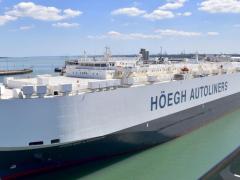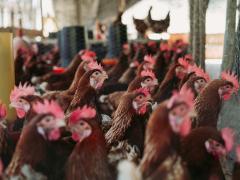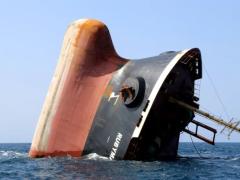RAY SMUTS THAT THE containership division of AP Moller-Maersk is having a rough passage this year goes without saying, but Per Heisselberg, Maersk Line’s new MD in South Africa, believes the days of despondency are largely over. “I think the acquisition (of PONL) has been a little more expensive than we expected and we are having not so good a year but freight rates are up again and we are very optimistic about next year, anticipating very healthy growth,” says the 46-year-old Dane, until recently MD for Maersk in Bangladesh. His reference to “not so good a year” relates to Maersk’s first-half profits crashing from US$871 million to a loss of US$607 million and its admission that the integration of PONL, changing the service network and introducing a new IT system, have been too big an undertaking to handle all at once. What is more, the carrier believes there is little chance of an improvement to the bottom line in the latter half of the year. Affable Heisselberg, a chartered ship broker before joining Maersk in 1983, can lay claim to being an Asian ‘veteran’ as he has spent 16 of his 23 years with the line on that vast continent. Though ethnicity and religion may differ from country to country, he says the culture of doing business in Asia is pretty much the same as in the western world. English is one of the official languages in Bangladesh, for instance. “As we say, ‘our word is your bond’, and that applies in many countries as everyone realises today you can cheat people once but not twice. I have never had any serious problems as people are essentially interested in a win-win relationship.” Like his predecessor, Flemming Dalgaard, now Maersk MD in the UK, this is a promotion for Heisselberg, who heads a staff complement of some 400 people, double that in Bangladesh. His responsibilities do not only relate to South Africa but all the neighbouring states - Mozambique, Malawi, Zambia, Swaziland, Lesotho, Botswana and Namibia. For Heisselberg, the top priority is ‘having the engine room in order’, as he puts it, referring to customer service and sales. Also high on the list is growing Maersk’s reefer business in South Africa. The carrier already holds a stake in cold storage facilities in Cape Town and Johannesburg and is amenable to further investment should appropriate opportunities arise. As to a market deserving of special attention, Heisselberg is convinced China, currently South Africa’s number three export partner, will occupy top spot in years to come, thanks to its extremely well developed infrastructure. “You will see China opening up for fruits other than citrus, apples and pears, for instance. While India faces big challenges, he believes growth will be handicapped due to insufficient infrastructure, the same applicable to Bangladesh. “When I look at South Africa, I see the urgent need for investment in ports like Durban and Cape Town.” Although he has only been in the country for a short while, Heisselberg is acutely aware of the impasse over extending the Cape Town container terminal stack area, sharing the view of NPA port manager, Sanjay Govan, that the alternative of an inland terminal is not a cost-effective option.












